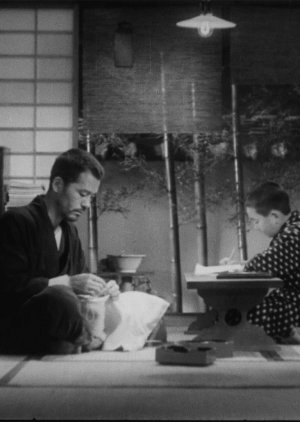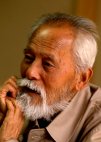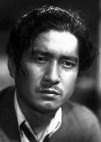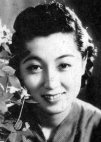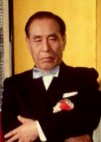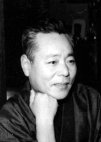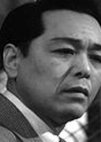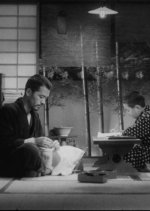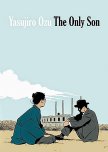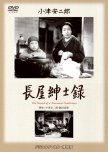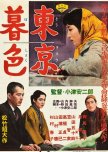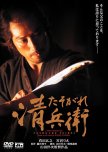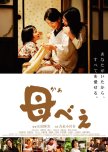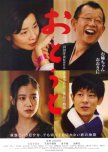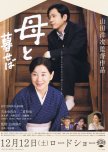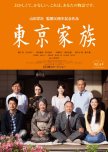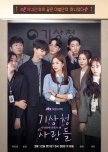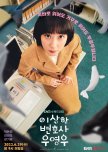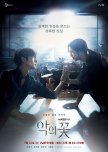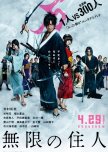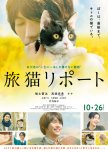A father and his son, a son and his father. Horikawa is a widower, a teacher, and a good father to Ryohei, who's about 10. After a tragedy, Horikawa resigns from teaching and takes Ryohei from Tokyo to the town of Ueno, enrolling him in junior high; to the lad's sorrow, he will be a border. Horikawa returns to work in Tokyo, their separation is complete. Jump ahead more than ten years: with dad's help, Ryohei has finished college and has a teaching job in Akita. Horikawa considers living with his son, which Ryohei wants, but the elder's notions of duty and hard work preclude it. Ryohei arranges a ten-day vacation with his father. Heartbreak comes quietly, nearly hidden by dignity. Edit Translation
- English
- magyar / magyar nyelv
- dansk
- Norsk
- Native Title: 父ありき
- Also Known As: Chichi Ariki ,
- Screenwriter & Director: Ozu Yasujiro
- Screenwriter: Ikeda Tadao, Yanai Takao
- Genres: Historical, Drama
Cast & Credits
- Ryu Chishu Main Role
- Sano Shuji Main Role
- Mito MitsukoFumiko HirataSupport Role
- Saburi ShinKurokawa YasutaroSupport Role
- Sakamoto TakeshiMakoto HirataSupport Role
- Himori ShinichiMinoru UchidaSupport Role
Reviews

You have to play the hand that's dealt...all the way...
There Was A Father is an Ozu film made during WWII. The film calls for personal sacrifice from its characters yet also shows the price to be paid for it. While well made, I can honestly say, I’m not sure whether I liked it or the message within. For over a decade a father uses his sense of duty to work, and only work, to not live with his son even when it no longer serves their relationship or his son’s future.Ozu regular Ryu Chishu played the lead role as the father, Shuhei. Shuhei was an esteemed teacher, but when a student dies on a school outing, he accepts responsibility, even though no one blames him, and leaves teaching. He takes his son to his hometown and enrolls him in a boarding school. While the father is looking for work this sounds perfectly understandable, however, when the father finds a job in Tokyo it becomes less clear why he doesn’t take his son to Tokyo with him. The time between visits grows further and further apart. Each parting is devastating for the son who is admonished by his father when he releases his heartbreak by crying.
When the son has graduated from college and begun teaching, he tells his father when they visit a hot springs inn, that he wants to quit his job and move to Tokyo to be with his father. His father admonishes him for letting his feelings get in the way of the work that was given to him. “The happiness that you acquire after going through hardship and joy, will be everlasting.” You have to not be selfish and let go of the self.
For the father, all there was in his life was work. Though he initially worked for his son to have a better life, he also worked for his own sense of duty. I have tried to determine if this was propaganda or simply a way of life. Some Ozu enthusiasts say yes, others say no. For me it felt like it was a man who abandoned not only the teaching profession, but his own son, when he failed to live up to his own personal standards. There did seem to be propaganda inserted in places when it came to the single focus on diligent work as dignity at the loss of familial ties if necessary. “At a time like this, we must all do our part.” The father proclaims that life is better when working as hard as one can. That should be enough.
In this film, despite the father’s excuses as to why they could not live together it was obvious the two loved each other. The son adored his father and hopelessly waited for the day they could be together even as a grown man. Before the father’s death, Shuhei made sure his son would have a good wife, arranging a marriage with the daughter of an old friend.
Ozu used parallel scenes, fishing scenes and train scenes that brought the story full circle. His trains seem to always point the way home, even after death. The fishing scenes as the two cast and moved in synchronization, showed the two at one with nature even if they were not of one mind. And as he often did, Ozu explored life through a parent and child. Here he seemed to be looking at the nature of sacrifice, duty and responsibility and the familial loss that came about through them. Or perhaps he was working out his own childhood as his father had gone to work in Tokyo to make a living for his family, leaving Ozu and his mother behind. Whatever the case, I struggled to understand why the father refused to have his son with him, even after the goals had been met. Unlike other Ozu films, the director left it up to the audience to decide instead of leaving bread crumbs for us to follow, or perhaps the notion was a common one at the time and didn’t need to be explained. Or finally, perhaps Ozu made a film that the censors would approve of while subtly criticizing the political structure and its societal price to be paid. Maybe I’m looking too deeply to find meaning in this film.
Regardless of the meaning behind the father’s actions, Ryu gave a superb performance as the father stubbornly adhering to his sense of duty. Ozu’s transitions didn’t always seem as smooth as in his other films, but that could also have been that there were censorship cuts made after the war. I feel like I write this in all my reviews of his films—his teapot showed up and had its usual closeup which always brings me great joy.
This would probably not be a good introduction to Ozu’s films for most people. It is a slow slice of life with a difficult message. The best scenes were when the father and son were together, sadly like their relationship it wasn’t often enough.
12/9/22

